A crucial component of our health, sleep should leave us feeling refreshed, alert, and prepared to face the difficulties of the day ahead. Although they make sure to get an apparently sufficient quantity of sleep each night, some people nonetheless struggle with an unusual problem: a constant sensation of tiredness.
Why do I constantly feel drowsy no matter how much sleep I get? is an intriguing topic that is brought up by this perplexing situation. Beyond the simple presumption that enough sleep time should reduce weariness, other complex factors are at play.
Discovering the causes of this chronic tiredness necessitates a thorough investigation, spanning everything from lifestyle choices and sleep disorders to underlying health issues and sleep quality.
In this blog, we explore the complex nature of this puzzle, illuminating the several factors that may be causing persistent sleepiness despite efforts to prioritize rest.
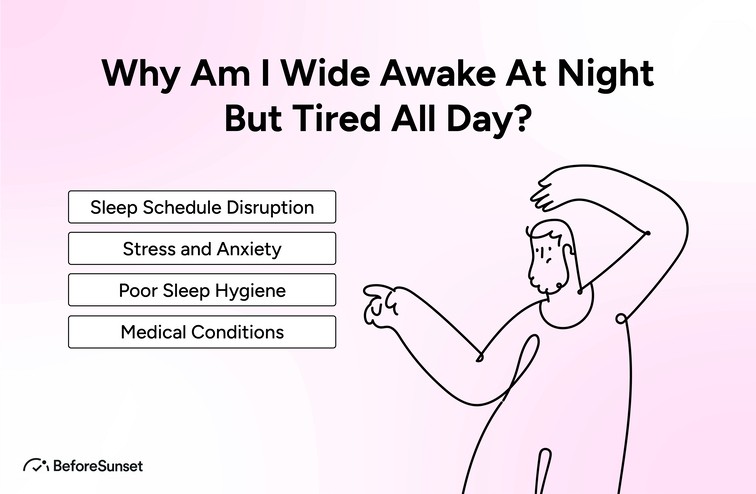
Why Am I Wide Awake At Night But Tired All Day?
Being weary all day and fully awake at night may be a frustrating and disturbing dichotomy in one's daily routine. In this case, a number of possible causes may be involved.
Poor sleep habits are a common factor in this issue. Your circadian rhythm, which is an internal clock that controls your sleep-wake cycle, may become misaligned as a result of irregular sleep habits, such as staying up late at night or sleeping in during the day. Your body finds it difficult to know when it should be awake or sleeping when your sleep routine is irregular. This can lead to problems falling asleep at night and extreme exhaustion throughout the day and cause lack of energy.
Anxiety and stress are two other major causes of this contradiction. Excessive stress or worry can make it difficult to unwind and get asleep at night by causing racing thoughts and heightened arousal. These unfavorable feelings can also cause fragmented and restless sleep, which leaves you feeling exhausted even after spending a significant portion of the night awake.
A frequent sleep issue called insomnia is another possible reason. Having trouble getting asleep, remaining asleep, or waking up too early are all signs of insomnia. It can be difficult for people who have insomnia to stay up and aware during the day since they may go through cycles of being awake at night and having trouble staying asleep during the day.
Your sleep-wake cycle may be seriously disturbed if you work night shifts or irregular hours, which can cause exhaustion throughout the day and midnight awakenings. Shift workers who try to sleep during the day when their body's natural circadian cycle signals alertness are especially prone to this.
Before going to bed, blue light from electronics might interfere with your sleep cycle. The hormone melatonin, which helps control sleep, is produced by your body but is interfered with by the blue light emitted by screens. As a result, even if you feel sleepy and exhausted throughout the day, you can have trouble falling asleep at night.
This contradiction may also be caused by specific medical disorders. Sleep disorders such as sleep apnea, restless legs syndrome, or persistent discomfort can cause awakenings during the night and disturb the quality of your sleep. You can thus wake up throughout the day feeling less rested than you did at night.
And last, drugs may affect how well you sleep. Certain drugs, such corticosteroids, certain antidepressants, and stimulants, might disrupt your sleep cycles, causing exhaustion during the day and alertness at night.
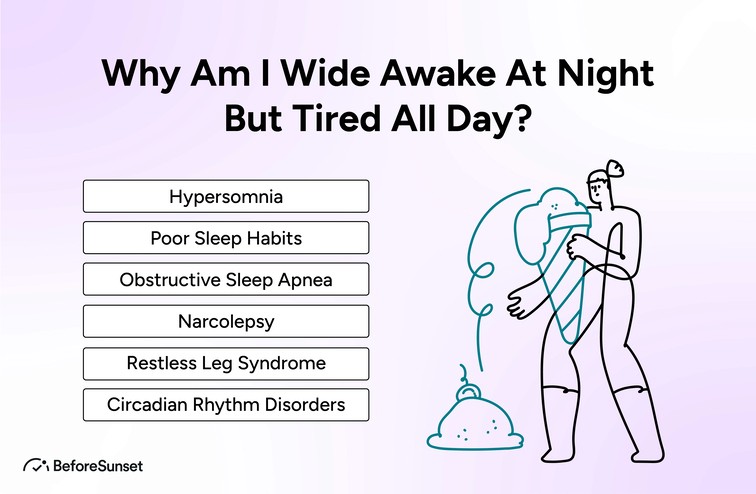
The Reasons Why You Are Always Sleepy
It is puzzling and upsetting to always feel weary while making an effort to follow a regular sleep schedule. Although sleep is supposed to restore and reenergize us, chronic tiredness can interfere with everyday tasks and worsen general wellbeing.
Contrary to common assumption, there are more causes for this persistent tiredness than just lack of sleep. Our degree of alertness during the day is influenced by a number of complex factors, including our health status, lifestyle decisions, and sleep habits.
Hypersomnia
In spite of getting enough or even more than enough sleep at night, those who struggle to remain awake during the day are said to have hypersomnia, a disorder characterized by excessive daytime drowsiness.
Contrary to the infrequent experience of being sleepy, hypersomnia is a chronic condition that can have a serious influence on a person's ability to function normally in everyday life, at work, and in general.
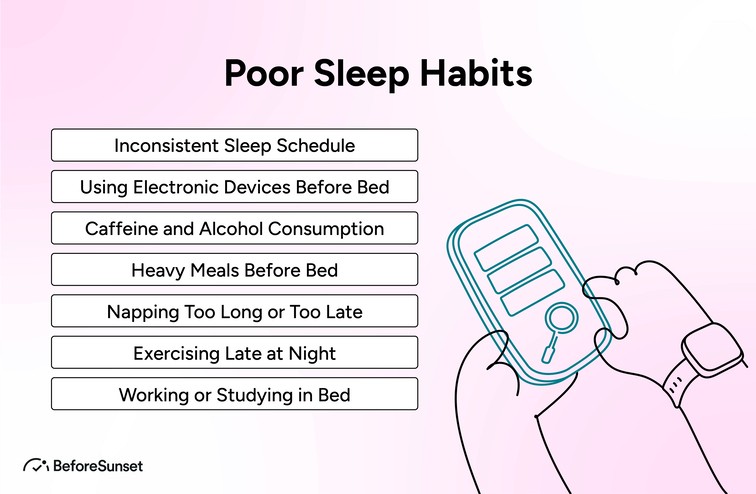
Poor Sleep Habits
Poor sleep habits refer to behaviors and practices that negatively affect the quality and duration of your sleep. These habits can lead to sleep difficulties, daytime sleepiness, and overall disruptions in your sleep-wake cycle. Identifying and addressing poor sleep habits is important for promoting better sleep and overall well-being. Here are some common poor sleep habits to be aware of:
Inconsistent Sleep Schedule: Going to bed and waking up at different times each day can disrupt your body's internal clock, making it harder to fall asleep and wake up refreshed.
Using Electronic Devices Before Bed: Exposure to the blue light emitted by phones, tablets, and computers before bedtime can suppress the production of melatonin, a hormone that helps regulate sleep.
Caffeine and Alcohol Consumption: Consuming caffeine and alcohol close to bedtime can interfere with your ability to fall asleep and stay asleep.
Heavy Meals Before Bed: Eating large, heavy meals close to bedtime can cause discomfort and indigestion, making it difficult to sleep well.
Napping Too Long or Too Late: Long or late-afternoon naps can disrupt your nighttime sleep. If you need to nap, keep it short and earlier in the day.
Exercising Late at Night: Vigorous exercise close to bedtime can increase alertness and make it harder to wind down for sleep.
Working or Studying in Bed: Associating your bed with activities other than sleep (like work or studying) can make it harder to relax and fall asleep.
Using the Bedroom for Entertainment: Watching TV, playing video games, or engaging in other stimulating activities in the bedroom can hinder your ability to wind down.
Ignoring Sleep Needs: Ignoring your body's signals of tiredness and pushing through sleepiness can lead to sleep deprivation and daytime sleepiness.
Not Creating a Relaxing Bedtime Routine: Failing to establish a calming pre-sleep routine can make it challenging to transition from wakefulness to sleep.
Sleeping in on Weekends: Drastically altering your sleep schedule on weekends can disrupt your circadian rhythm and make it harder to wake up on weekdays.
Using the Snooze Button: Hitting the snooze button multiple times disrupts your sleep cycles and can leave you feeling groggy.
Sleeping in an Uncomfortable Environment: An uncomfortable mattress, poor room lighting, or excessive noise can negatively impact your sleep quality.
Obstructive Sleep Apnea
A common sleep problem called obstructive sleep apnea (OSA) is characterized by recurrent bouts of disrupted breathing while you're asleep. This happens when the airway briefly collapses or is obstructed because the muscles at the back of the throat are unable to keep it open.
As the body tries to restore regular breathing after these apneas, there may be short awakenings or partial awakenings throughout the night. Loud snoring, disturbed sleep cycles, and daytime tiredness can all be symptoms of OSA.
It is linked to a number of health hazards, including a higher risk of diabetes, high blood pressure, and cardiovascular problems.
Common therapeutic methods for controlling OSA and enhancing sleep quality and general wellbeing include Continuous Positive Airway Pressure (CPAP) therapy, lifestyle modifications, and occasionally surgical treatments.
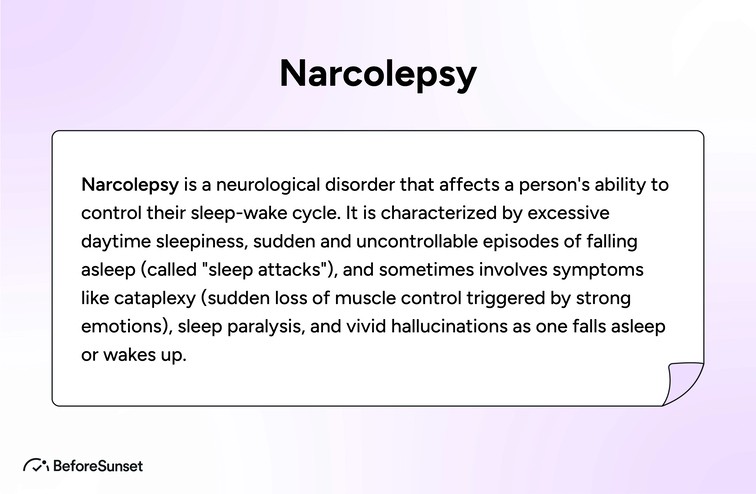
Narcolepsy
A neurological sleep disease known as narcolepsy is characterized by abrupt, unpredictable bouts of extreme daytime drowsiness. Strong emotions can cause an abrupt decrease of muscular tone known as cataplexy, which can lead to weakness or even momentary paralysis in narcoleptics.
Other symptoms might include intense dream-like hallucinations and sleep paralysis, which is a momentary incapacity to move or talk either falling asleep or waking up. A lack of the neurotransmitter hypocretin, which controls alertness and REM sleep, results in narcolepsy.
Despite the fact that there is no cure, narcolepsy patients may control their symptoms and enhance their quality of life with the aid of treatment alternatives such medication, lifestyle changes, and sleep management techniques.
Restless Leg Syndrome
RLS, also known as Willis-Ekbom Disease, is a neurological condition marked by an uncontrollable impulse to move the legs, which is frequently accompanied by unpleasant feelings.
Oftentimes during moments of rest or inactivity, especially in the evening or at night, these crawling, tingling, or itching sensations are worse. Although moving the legs briefly eases the discomfort, the signs and symptoms might interfere with sleep and make it difficult to get to sleep or remain asleep.
RLS may cause daytime drowsiness, exhaustion, and a decline in quality of life. Genetic factors and anomalies in dopamine levels in the brain are thought to be contributing causes, while the exact reason is still not entirely known.
RLS symptoms can be reduced and sleep and general health can be improved with the aid of medicine, lifestyle adjustments, and the management of underlying medical disorders.
Circadian Rhythm Disorders
Disorders of the body's natural internal clock, which controls the sleep-wake cycle and other physiological functions over an approximately 24-hour period, are referred to as circadian rhythm disorders.
Due to a mismatch between the body's internal rhythm and environmental cues like light and dark, these diseases can cause problems falling asleep, being sleepy throughout the day, and other health problems.
Examples of circadian rhythm disorders include shift work sleep disorder (sleep issues as a result of working night shifts or rotating shifts), advanced sleep phase disorder (falling asleep and waking up earlier than desired), and delayed sleep phase disorder (a tendency to go to bed and wake up later than desired).
In order to synchronize the body's internal clock with everyday activities, proper management entails changing sleep schedules, increasing exposure to natural light, and, in some circumstances, employing melatonin supplements or other therapies.
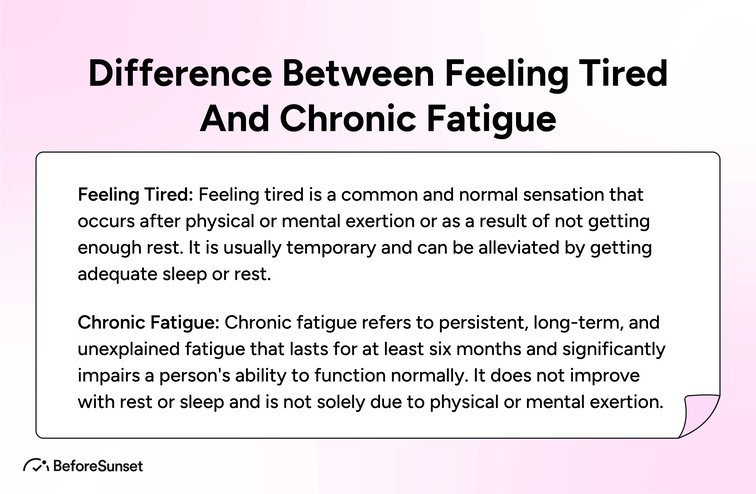
Difference Between Feeling Tired and Chronic Fatigue
Although both tiredness and chronic fatigue have certain characteristics, their duration, severity, and underlying causes vary.
Feeling Tired:
Tiredness is a typical and acceptable reaction to physical or mental effort. It frequently results after a day's worth of activity, little sleep, or brief stress. Most people can get over their fatigue and restore their vitality after some downtime or sleep. By obtaining enough sleep, maintaining proper sleep hygiene, and controlling your stress, you may stop feeling weary. It is a transient condition that often goes away with good self-care.
Chronic Fatigue:
On the other hand, chronic fatigue is defined by a severe and persistent exhaustion that lasts for at least six months and does not considerably improve with rest.
In addition to being accompanied by additional symptoms including cognitive problems, sore throats, muscular discomfort, and swollen lymph nodes, this exhaustion is not just the result of exercise or activity.
The medical illness known as myalgic encephalomyelitis (ME), sometimes known as chronic fatigue syndrome (CFS), is a difficult-to-diagnose neurological ailment. Because CFS is a diagnosis of exclusion, it must first be determined that no other medical illnesses exist.
Although the precise reason is yet unknown, treating symptoms, enhancing sleep, and addressing underlying causes are frequently combined in therapy.
How Do I Fix My Sleeping Debt?
You must emphasize good sleeping practices and gradually alter your daily schedule in order to address and pay off your sleeping debt. Start by creating a regular sleep routine, especially on the weekends, by going to bed and getting up at the same time each day.
Make sure the space where you sleep is cozy, quiet, and dark. Avoid bright lights and screens immediately before bed since they might interfere with your body's melatonin synthesis. Steer clear of coffee and large foods right before bed.
Exercise on a regular basis, but avoid doing so just before bed. Lastly, use relaxation methods to control your tension and anxiety, such as deep breathing exercises or meditation. By implementing these techniques, you may progressively raise the quality of your sleep and awaken feeling more rested and focused, even if it could take some time to pay off your sleep debt.
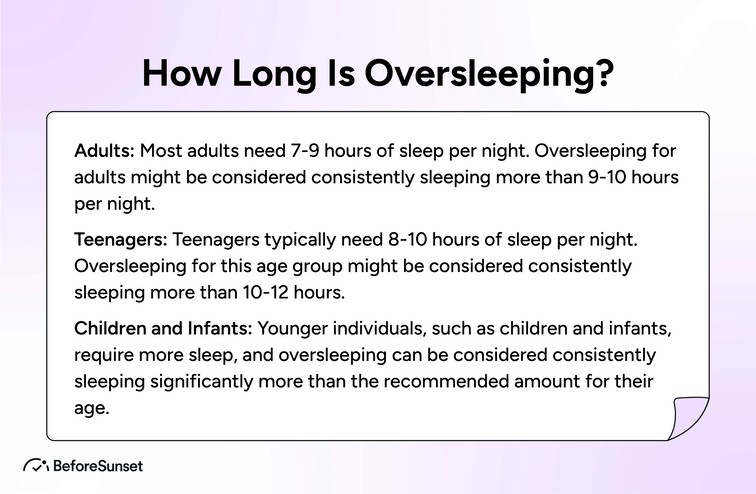
How Long Is Oversleeping?
The definition of oversleeping, sometimes called hypersomnia, varies from person to person depending on how much sleep is too much. Oversleeping is the term used to describe sleeping far more than the recommended 7-9 hours per night for most individuals; this usually means sleeping more than 9–10 hours per night. It's crucial to remember that everyone has different sleep demands, and some people may inherently need more sleep than others.
When oversleeping interferes with day-to-day functioning and results in drowsiness, difficulties getting up, or other health problems including an elevated risk of obesity, diabetes, or depression, it becomes a worry.
To rule out any underlying medical illnesses or sleep disorders, it's a good idea to see a healthcare provider if you find yourself oversleeping on a regular basis and it's negatively affecting your quality of life.
Do I Have Sleep Inertia?
The drowsy, confused sensation that many people wake up with—which can linger anywhere from a few minutes to several hours—is known as sleep inertia. You may have sleep inertia if you often find it difficult to get out of this fog when you wake up after a nap or a full night's sleep.
Your body and brain are changing from a state of rest to awake, which is why this occurrence happens. The depth, length, and timing of your awakenings during your sleep cycle are some of the variables that might affect how severe your case of sleep inertia is.
Establishing a regular sleep routine, resisting the need to press the snooze button, and exposing yourself to natural light as soon as you wake up can all help your body acclimate to the new day if you suffer from sleep inertia on a regular basis.
Finish Your Work Early Using BeforeSunset AI
Create to-do lists, prioritize tasks, and track your progress using BeforeSunset AI. Break down your work into manageable tasks, set deadlines, and categorize them based on their urgency and importance.

